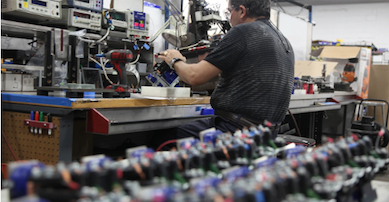The 4 Benefits Of Outsourcing Electrical OEM Manufacturing
A manufacturer of electrical OEM components was under pressure to reduce costs while maintaining quality, so they outsourced their manufacturing process. This resulted in significant cost savings and positive impacts on their bottom line. But that’s only one of the many benefits of OEM outsourcing.
In this blog post, we’ll explore four key benefits of outsourcing electrical OEM manufacturing. From cost savings to specialized expertise, scalability, and focusing on core competencies, we will explain why outsourcing can keep your business competitive.
1. Cost savings
One of the most significant benefits of outsourcing electrical OEM manufacturing is cost savings. Outsourcing allows companies to reduce their operating costs significantly by taking advantage of the lower labor costs and reduced overheads in countries where labor is cheaper.
Additionally, outsourcing eliminates the need for capital investments in manufacturing equipment, facilities, and personnel, which can be a significant financial burden for companies.
For example, some companies outsource the manufacturing of OEM electrical components to Southeast Asian providers. As a result of this, the companies experience reductions in their labor and operating costs. The provider’s expertise in managing inventory, sourcing materials, and maintaining production efficiency added to the savings, helping the company maintain its profitability despite the competition.
Outsourcing electrical OEM manufacturing can provide cost savings in quality control as third-party providers often have extensive processes in place to ensure consistent product quality, preventing costly mistakes and recall.
Furthermore, outsourcing frees up internal resources, allowing companies to focus on more critical business functions like research and development, sales, and marketing, leading to increased revenue and sustainable growth.
Overall, outsourcing provides significant cost savings, enabling companies to remain competitive and profitable in a challenging global marketplace.
2. Access to specialized expertise
Outsourcing electrical OEM manufacturing also provides companies with access to specialized expertise that may not be available in-house. Third-party providers often have a dedicated team of engineers and technical staff who possess specialized skills and knowledge that can enhance the quality and efficiency of the manufacturing process.
Most companies tend to struggle to keep up with the latest industry technology due to insufficient in-house expertise. By outsourcing the manufacturing process to a provider like MAC Products, which has specialized knowledge, these companies can access the provider’s expertise and stay current with cutting-edge technology. This also allows the companies to develop and launch new products and features, offering them a competitive edge in the market.
In addition to technical know-how, outsourcing offers access to global logistics networks and supply chains, which can benefit companies expanding their operations into new countries or regions. Outsourcing providers can offer insights into local customs procedures and regulations, helping companies navigate the intricate international trade landscape.
Moreover, outsourcing provides companies with the flexibility to adapt their manufacturing processes in response to changing market conditions or customer needs. This is especially helpful for companies with seasonal products or fluctuating demand.
Put simply, outsourcing electrical OEM manufacturing can provide companies with access to specialized expertise that can enhance the quality and efficiency of their manufacturing processes. By leveraging third-party providers’ technical knowledge and global networks, companies can remain competitive in a rapidly evolving marketplace.
3. Scalability
Outsourcing electrical OEM manufacturing offers companies scalability and flexibility not possible with in-house manufacturing.
Take, for example, the supply chain needs required when setting up OEM manufacturing. If you do this in-house, you’ll have to spend a ton of resources putting those networks in place. This can take years, and it requires exceptional expertise to set up the configurations and workflows and ensure everything meets the required quality standards.
Not only is it time-consuming, but it’s also super expensive. In contrast, OEM outsourcing sets you up with a reputable manufacturer who already has the supply chain processes set up. This smoothens your operations. They also do regular quality control checks ensuring their customers receive nothing but the best products.
Outsourcing allows production levels to be adjusted based on demand without significant capital investment. A growing electrical original equipment manufacturer can outsource its manufacturing of items like splicing accessories to a provider with a scalable process to meet increases in demand. This allows the company to maintain growth without significant capital investments.
Outsourcing also allows companies to access additional production capacity during peak seasons or sudden surges in demand. This can prevent production bottlenecks and ensure that customers receive their products on time, even during high-demand periods.
Outsourcing electrical OEM manufacturing also eliminates the risk of overproduction or underproduction and reduces waste, maximizing profits. Your company will be able to increase or decrease production based on market needs without losing any resources in the process. This makes OEM outsourcing an extremely cost-effective option.
4. Focus on core competencies
Finally, outsourcing electrical OEM manufacturing helps companies to concentrate on their core competencies, leading to increased innovation and competitiveness. By outsourcing non-core manufacturing processes, companies can refine their core products and services, adding more value to their business.
Outsourcing reduces operational costs by eliminating the need for significant investments in infrastructure, personnel, and equipment. This frees up capital for other business areas.
By leveraging third-party providers’ expertise, scalability, and flexibility, companies can focus on core competencies, increase innovation and competitiveness, and achieve business objectives while maintaining growth in a rapidly evolving marketplace.
In Closing
As we’ve seen, outsourcing electrical OEM manufacturing provides numerous benefits for companies. The benefits include cost savings, access to specialized expertise, scalability, and the ability to focus on core competencies.
Leveraging the expertise and capabilities of third-party providers helps companies optimize their production processes, reduce costs, and increase profitability while maintaining their growth trajectory. Outsourcing can be a powerful tool for companies looking to remain competitive in a rapidly evolving marketplace.
However, it’s crucial for companies to carefully evaluate potential providers and ensure that they have the necessary capabilities, certifications, and quality standards to meet their unique needs.
For example, we have strict quality control processes at MAC Products that have helped serve the industry for over 50 years. Our skilled engineers deliver the highest quality products for electrified transit, electric unit, construction, and OEM items.





















